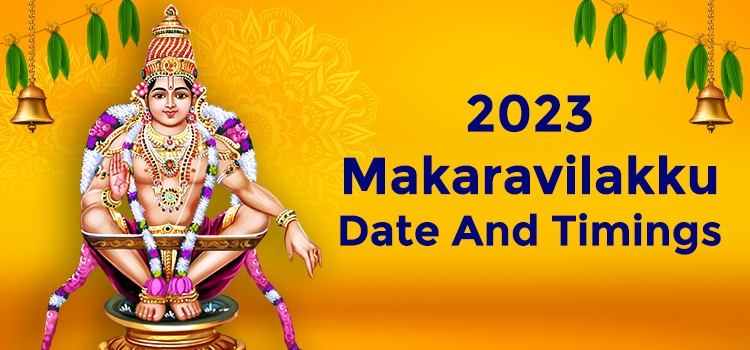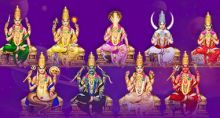Makaravilakku 2023 Date And Timings
Makaravilakku, or Makara Jyothi, is an important festival associated with the deity, Ayyappan, and the Sabarimala shrine in Kerala. It is a very important festival that attracts lakhs of devotees from all over South India.
The Legend of Sabarimala Ayyappa
Ayyappa was the foster son of King Rajashekara, who hailed from the Pandya dynasty and ruled Pandalam in the state of Travancore.
Rajashekara was much loved by his subjects, and he presided over a golden age. But the king was childless. He and his queen prayed to Shiva for a child.
At the same time, a demon called Mahishasura did severe penance and won a boon from Brahma that nobody on earth could kill him. Mahishasura then began to harass people. Fearing him, people fled from their homes. Finally, Goddess Durga killed him in a fierce battle.

Mahishi, the sister of Mahishasura, got a boon from Brahma that only an offspring of Vishnu (Hari) & Shiva (Haran) could kill her. Mahishi then began to harass the gods, who begged Vishnu to intervene. As only the son of Shiva and Vishnu could kill Mahishi, Vishnu took the form of Mohini, and a male child was born from the union of Mohini and Shiva.
During a hunt in the forests near the Pampa river, King Rajashekara came across the infant. At the same time, a holy man appeared from nowhere and told him to take the infant to his palace. He also said that the child would end his dynasty’s troubles and that when the boy became 12 years old, the king would realize his divinity. The child had a gold chain around his neck, and the holy man told the king to name him ‘Manikandan’ or ‘one with a golden neck’.
Rajashekhara took the child home and raised the boy in the palace. Manikandan was an intelligent and precocious boy. He was good at martial arts and shastras and had superhuman talents. He even restored sight and speech to his guru’s blind and dumb son. Meanwhile, the queen had delivered a son who was named Raja Rajan. King Rajasekara decided to crown Manikandan as his heir apparent as he felt that he was the cause of such miraculous events and also considered him to be his eldest son. But the Diwan, who secretly wanted to be the king, poisoned the queen’s mind against Manikandan.
He made her feign illness and then told the court physician to proclaim that only a tigress’ milk could cure her. Rajasekara announced that he would give half his kingdom to the person who could cure the queen. Manikandan said he would go to the forest and bring the tigress’ milk. While roaming in the forest, he saw the atrocities of the demoness Mahishi. He fought her and finally killed her.
After his confrontation with Mahishi, Manikandan had a darshan of Shiva, who revealed the secret of his birth to him, and assured him that Indra would help him to get the tigress’ milk. Manikandan returned to the palace, seated on Indra, who was disguised as a tiger. He was followed by tigresses and tigers who were actually goddesses and gods in disguise.
Meanwhile, the holy man reappeared and told the king who Manikandan really was. The king fell at the boy’s feet and apologized for his wife’s behavior. Manikandan turned twelve years old the day he returned from the forest.
Rajasekara wanted to punish his Diwan, but Manikandan advised him not to, as everything that had happened was the will of God. He also told his father that he would return to Devaloka as he had accomplished his duty. Rajasekara told him that he wanted to build a temple for him. Manikandan aimed an arrow, and it fell at a place called Sabari. He told the King to build the temple there and disappeared.
On the advice of Sage Agasthya, the king laid the temple’s foundation stone at Sabarimala. Manikandan had said that he would bless only the devotees who observed forty-one days’ penance or vrat that involved strict abstinence.
It is believed that Ayyappa or Dharmasastha sent Parasurama, who created the land of Kerala, to Sabarimala, and the latter carved the image of Ayyappa and installed it on Makara Sankranthi day.
Millions of devotees visit Sabarimala each year with garlands and irumudis, singing paeans to Ayyappa. They bathe in the holy river Pampa and climb up the eighteen steps (pathinettam padi) to catch a glimpse of the deity.
The temple stands atop the rugged hills of the Western Ghats. The main pilgrimage takes place between November and January. Devotees undergo strict penance before the pilgrimage. People of all castes and creeds visit the shrine. They wear black or deep blue attire and carry on their heads cloth bundles that contain traditional offerings like coconuts filled with ghee, camphor, and rice. Only females who are past their menopausal age or have not attained puberty can worship at the shrine.
Makara Jyothi and Makaravilakku
The Makara Jyothi (Sirius) star becomes visible in the evening sky on Makara Sankranti. It marks the transit of the Sun from Dhanu rashi (Sagittarius) to Makara rashi (Capricorn). January 14 is the first day of Makaram, the Malayalam month. On Makara Sankranthi, the Sun begins its journey to the northern hemisphere.
The annual Sabarimala pilgrimage ends with the sighting of the Makara Jyothi. On this day, Ayyappa's ornaments are taken in procession to the Sabarimala temple from the Pandalam palace, which is around 80 km away. This takes place in the evening. The Pandalam royals have custody of these sacred ornaments, called Thiruvabharanam. The deity is adorned with the ornaments.
Before the evening Deeparadhana or Aarti at the Sabarimala temple, an eagle can be seen hovering over the temple 9 times. Then the Makara Jyothi (star) appears in the sky, followed by the appearance of the Makaravilakku.
Makaravilakku is a light that is lit on the Ponnambalamedu plateau that lies across the Sabarimala temple. The light supposedly has divine origins. The Tantri, or chief priest of the temple in Pampa at the base of Sabarimala, shows the light to the pilgrims thrice.
Malaya araya tribals performed this ritual in the old days. But after the Travancore Devaswom Board took over the temple's administration in the early 1950s, they lost this right.
The Makaravilakku festival lasts for seven days. Many devotees remain in Sabarimala until the festival is over and the Kuruthi Pooja is performed.
Sabarimala Makara Jyothi Date
January 14, Saturday
6 pm – 8 pm
Makaravilakku Timing
Timing: 6.30 pm – 7.30 pm on January 14



















